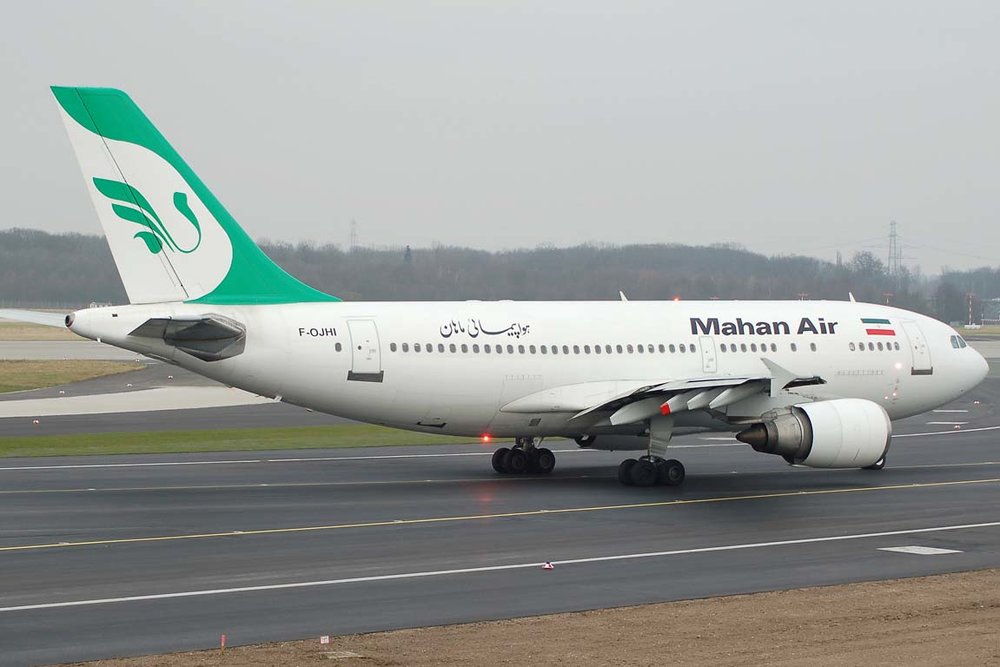An Iranian civil aviation official has come out against U.S. sanctions that were recently imposed on the country’s airline industry, saying they will have no negative effects.
“The US sanctions against Iran and its airlines are not something new, and every now and then, a new embargo is imposed on our country,” a spokesman for Iran’s Civil Aviation Organization Reza Jafarzadeh told Tasnim news agency on December 13.
“[Iran’s aviation industry] will use the past experiences, and will continue to manage the Iranian air transport like in the past four decades,” Jafarzadeh said, adding, “given the past experiences of the country, the aviation industry officials have already anticipated such issues and know what to do in this situation.”
On December 11, the U.S. Treasury Department’s Office of Foreign Assets Control (OFAC) imposed new sanctions on three general sales agents for Iran’s biggest airline, Mahan Air, which are based in the United Arab Emirates and Hong Kong. The agency also blacklisted Iran Shipping Lines.
The Treasury Department has accused the organizations of being, “involved in smuggling lethal aid from Iran to Yemen on behalf of the Islamic Revolutionary Guards Corps and its elite foreign paramilitary and espionage arm, the Quds Force,” according to a statement posted on the department’s website.
“The Iranian regime uses its aviation and shipping industries to supply its regional terrorist and militant groups with weapons, directly contributing to the devastating humanitarian crises in Syria and Yemen,” Treasury Secretary Steven Mnuchin said.
“Aviation and shipping industries should be vigilant and not allow their industries to be exploited by terrorists.”
According to the department, Mahan Air has transported Iranian fighters and munitions to Syria to prop up the regime of Syrian President Bashar al-Assad, and the airline's general sales agents propped up its business operations.
The U.S. State Department targeted Shanghai-based ESAIL Shipping Company, which U.S. Secretary of State Mike Pompeo said, "knowingly transports illicit materials from Iran's Aerospace Industries Organization, which oversees all of Iran’s missile industry." Pomepo has asserted that ESAIL has worked with Iranian organizations subject to U.N. sanctions.
Sanctions on ESAIL and additional sanctions on Islamic Republic of Iran Shipping Lines will go into effect in June.
Earlier this year, on July 23, OFAC issued an advisory informing the civil aviation industry of potential exposure to U.S. sanctions for, “providing unauthorized support to designated Iranian airlines, many of which, including Mahan Air, are involved in facilitating the Iranian regime’s support to proxy militias.”
On December 9, the European Commission updated the EU Air Safety List – a list of airlines that do not meet international safety standards and are therefore subject to an operating ban or operational restrictions within the European Union. According to the latest list, Iran Aseman Airlines is banned from EU skies, and Iran Air is subject to operational restrictions and can only fly to the EU with specific aircraft types.
In November, Italy’s air authority ENAC announced that the ban on Mahan’s flights to Rome and Milan would go into effect mid-December.
Tensions between Iran and the U.S. have increased since May 2018, when the Trump administration pulled the U.S. out of the nuclear deal, known as the Joint Comprehensive Plan of Action (JCPOA), which was brokered during the Obama administration and signed in 2015. Following the withdrawal, Washington imposed new sanctions against Tehran, and U.S. President Donald Trump has vowed to reduce Iran’s oil exports to zero.
Meanwhile, Iranian private and public aviation firms and agencies have made efforts to try and strengthen a sector of Iran’s economy that has been hard hit since the Islamic Revolution in 1979, when the aviation industry was virtually cut off from purchasing spare parts needed to repair and upgrade aircraft. According to reports, Iran’s domestic aviation sector signed 163 agreements worth $46.15 million with local knowledge-based companies and startups on December 8.







 Russian peacekeeping forces, deployed in the Karabakh (Garabagh) region of Azerbaijan since 2020, have commenced their withdrawal from the area.
Russian peacekeeping forces, deployed in the Karabakh (Garabagh) region of Azerbaijan since 2020, have commenced their withdrawal from the area.
 The number of evacuees from flooded areas in Kazakhstan has reached 97,852 people, including about 32,856 children since March 27.
The number of evacuees from flooded areas in Kazakhstan has reached 97,852 people, including about 32,856 children since March 27.
 The Islamic holy month of fasting, Ramadan comes to an end this week with the celebration of a joyous festival called Eid (meaning “festival” in Ar...
The Islamic holy month of fasting, Ramadan comes to an end this week with the celebration of a joyous festival called Eid (meaning “festival” in Ar...
 Azerbaijan officially unveiled the logo for the upcoming 29th session of the Conference of the Parties to the United Nations Framework Convention o...
Azerbaijan officially unveiled the logo for the upcoming 29th session of the Conference of the Parties to the United Nations Framework Convention o...



